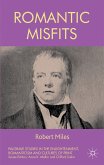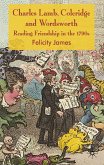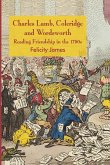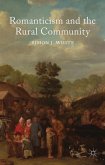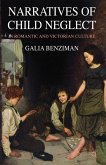This book explores the false starts and disturbances of Romantic writing in Britain - 'misfits' and misfittings - as both a constitutive challenge to canonical romanticism and a distinctive literary field worth examining on its own account. Misfits include the Shakespeare forger W.H. Ireland, the novel itself, and the culture of Dissent.
'. . .a book that contains such a wealth of material and perceptive discussion...' - English Studies
'Miles offers a nuanced understanding of Romanticism's origins, cultural manifestations, and legacy. Romantic Misfits makes important points about the limitations of the historical models that have organized Romantic studies, and it attests to the rewards of critically examining scholarly clichés and cultural givens.' - Nicole Reynolds, Eighteenth-Century Fiction
'Robert Miles's Romantic Misfits is an erudite, far-ranging reconsideration of Romanticism that cleverly fuses both old and new conceptualizations of the period. . . Romantic Misfits remains an outstanding, learned and deeply thoughtful achievement, presenting an updated narrative of Romantic critical history that will solidify the reader's grasp of the interplay and progress of seminal modes of thought.' - Celestine Woo, Romantic Circles Review
'This project creates the opportunity for a wide-ranging discussion on the vexed issue of the 'canon', and Miles's five chapters consider a comprehensive selection of writers.' - English Studies
'Robert Miles's wonderful new book, Romantic Misfits, examines the dialectic of inclusion and exclusion in the formation of the Romantic poetic canon. . . Miles's wide-ranging chapters on W.H. Ireland's Shakespeare forgeries, Wordsworth's Gothic, Thomas Carlyle's and Coleridge's abjects, the Romantic novel's technologies, and Anna LaetitiaBarbauld's feminism are chock-full of magical and fresh material.' - Studies in English Literature, 49:4
'His interrogation of these processes of selection and organization which have had such enduring impact, not just on the formation of the Romantic canon but more fundamentally, on our inherited ideas about literature itself, is driven by a shrewd blend of theoretical analysis (especially Pierre Bourdieu and Jurgen Habermas, though Miles helpfully reads the latter through J.L. Austen's speech act theory), historical contextualization, and subtle literary readings.' - Paul Keen, European Romantic Review
'Professor Miles' striking Romantic Misfits is a very important and newly informative - book for scholars of both British Romantic and English 'Gothic' writing. I believe that Gothicists and Romanticists at every level of serious study should and will be unpacking this intense, deeply theoretical, and most revealing book for many years to come.' - Jerrold E. Hogle, University Distinguished Professor, The University of Arizona, USA
'Romantic Misfits is a truly groundbreaking study of Romantic literature and its relationship to the institutions and media of the Enlightenment. More than a study of how the Romantic canon took shape, Miles's book is an inquiry into the nature of canonicity itself, that is, why highly unconventional discourses become the basis for conventional thinking. It has fundamentally changed the way I think about the Romantic period and the critical ethos that is its legacy.' - Alexander Dick, Assistant Professor, University of British Columbia, Canada
'Miles offers a nuanced understanding of Romanticism's origins, cultural manifestations, and legacy. Romantic Misfits makes important points about the limitations of the historical models that have organized Romantic studies, and it attests to the rewards of critically examining scholarly clichés and cultural givens.' - Nicole Reynolds, Eighteenth-Century Fiction
'Robert Miles's Romantic Misfits is an erudite, far-ranging reconsideration of Romanticism that cleverly fuses both old and new conceptualizations of the period. . . Romantic Misfits remains an outstanding, learned and deeply thoughtful achievement, presenting an updated narrative of Romantic critical history that will solidify the reader's grasp of the interplay and progress of seminal modes of thought.' - Celestine Woo, Romantic Circles Review
'This project creates the opportunity for a wide-ranging discussion on the vexed issue of the 'canon', and Miles's five chapters consider a comprehensive selection of writers.' - English Studies
'Robert Miles's wonderful new book, Romantic Misfits, examines the dialectic of inclusion and exclusion in the formation of the Romantic poetic canon. . . Miles's wide-ranging chapters on W.H. Ireland's Shakespeare forgeries, Wordsworth's Gothic, Thomas Carlyle's and Coleridge's abjects, the Romantic novel's technologies, and Anna LaetitiaBarbauld's feminism are chock-full of magical and fresh material.' - Studies in English Literature, 49:4
'His interrogation of these processes of selection and organization which have had such enduring impact, not just on the formation of the Romantic canon but more fundamentally, on our inherited ideas about literature itself, is driven by a shrewd blend of theoretical analysis (especially Pierre Bourdieu and Jurgen Habermas, though Miles helpfully reads the latter through J.L. Austen's speech act theory), historical contextualization, and subtle literary readings.' - Paul Keen, European Romantic Review
'Professor Miles' striking Romantic Misfits is a very important and newly informative - book for scholars of both British Romantic and English 'Gothic' writing. I believe that Gothicists and Romanticists at every level of serious study should and will be unpacking this intense, deeply theoretical, and most revealing book for many years to come.' - Jerrold E. Hogle, University Distinguished Professor, The University of Arizona, USA
'Romantic Misfits is a truly groundbreaking study of Romantic literature and its relationship to the institutions and media of the Enlightenment. More than a study of how the Romantic canon took shape, Miles's book is an inquiry into the nature of canonicity itself, that is, why highly unconventional discourses become the basis for conventional thinking. It has fundamentally changed the way I think about the Romantic period and the critical ethos that is its legacy.' - Alexander Dick, Assistant Professor, University of British Columbia, Canada


